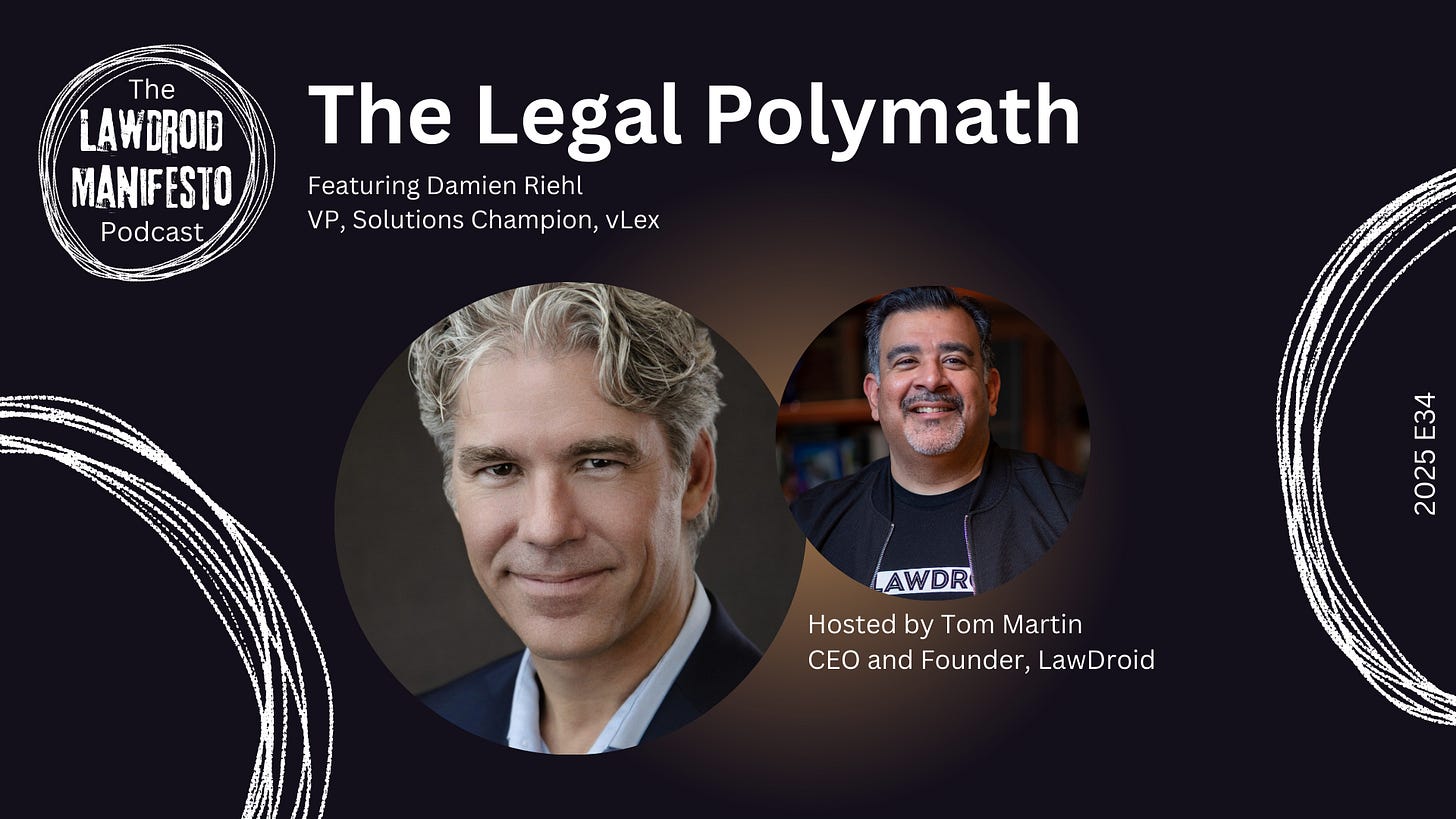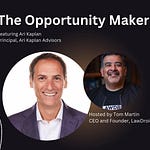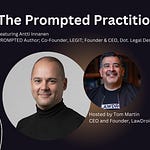Hey there Legal Rebels! 👋 I'm excited to share with you the 34th episode of the 2025 season of the LawDroid Manifesto podcast, where I will be continuing to interview key legal innovators to learn how they do what they do. I think you're going to enjoy this one!
I’ve known Damien for years and I’ve always been impressed by him, not only is Damien wicked smart, but his heart is in the right place. He’s a do-gooder in the best sense of the word and it inspires confidence in the future to know he is out there making the world a better place. And, because of Damien’s many talents, I have dubbed him “The Legal Polymath.”
If you want to understand how legal technology can democratize access to justice while tackling fundamental issues like data interoperability and copyright law, you need to listen to this episode. Damien is at the forefront of legal AI innovation and has created groundbreaking solutions that benefit both the legal profession and society at large.
Revolutionizing Legal Technology Through Systems Thinking and Service
Join me as I interview Damien Riehl, solutions champion at vLex, whose polymath approach to legal innovation spans artificial intelligence, data standardization, music copyright, and cybersecurity.
In this insightful podcast episode, Damien shares his remarkable journey from small-town North Dakota roots through music education, federal judicial clerkships, BigLaw litigation, and ultimately to the cutting edge of legal technology. He dives deep into his work with vLex's billion-document dataset and large language models, his groundbreaking SALI project that created interoperability standards for legal data, and his extraordinary music copyright initiative that has copyrighted 471 billion melodies to protect artists from frivolous lawsuits.
His stories and insights underscore a deep commitment to using technology for public benefit, including his pro bono work on data standards and his role investigating Cambridge Analytica at Facebook. This episode demonstrates how combining technical expertise with legal knowledge can create solutions that serve both the profession and society at large.
[This interview was recorded prior to the announcement of Clio’s acquisition of vLex.]
The Skinny
Damien Riehl, solutions champion at vLex, represents a new breed of legal technologist whose work spans artificial intelligence, data interoperability, music copyright law, and cybersecurity. Growing up in small-town North Dakota with a boilermaker father who instilled strong work ethics, Damien's path led through music education, federal judicial clerkships, nine years of BigLaw litigation at Robbins Kaplan, and pioneering roles at Thomson Reuters and Fastcase. His Catholic upbringing drives a commitment to service that manifests in groundbreaking pro bono projects: the SALI data standardization initiative that enables interoperability between legal systems worldwide, and a music copyright project that has protected artists by copyrighting 471 billion melodies and placing them in the public domain. His work demonstrates how combining technical expertise with legal knowledge can democratize access to justice and solve systemic problems affecting both the legal profession and society at large.
Key Takeaways:
Started coding at age 10 on a Commodore 128, building the technical foundation for legal innovation
Wrote 52 judicial opinions per year during federal clerkships, gaining exceptional breadth of legal experience
Spent nine years at Robbins Kaplan on major cases like tobacco litigation with top-tier litigators
Created patented task-based legal project management system at Thomson Reuters
Built SALI project with 18,000 standardized legal data tags in 20 languages for vendor interoperability
Copyrighted 471 billion melodies to protect artists from frivolous copyright lawsuits
AI can address 92% of unmet legal needs through dramatic cost reduction and Jevons paradox
Catholic faith drives thousands of hours donated to pro bono public benefit projects
ADHD diagnosis at 47 explains ability to juggle multiple complex projects simultaneously
Notable Quotes:
"I think we're going to have abundance if we let it. That is if we don't muck it up. And I think the risk of mucking it up is quite high." - Damien Riehl (44:40-44:45)
"Everything we as lawyers do is based on words. We ingest them, we analyze them, and we output words. Large language models can do that at superhuman speed in a postgraduate level." - Damien Riehl (15:04-15:13)
"We can't pro bono our way out of this, but maybe we can large language model our way out of this." - Damien Riehl (45:28-45:31)
"What if legal work were too cheap to measure? What if today or yesterday, somebody might say, gosh, Tom, my lawyer, every time I call him, it's $1,000. Forget it. I'm just going to risk it." - Damien Riehl (46:41-46:50)
"I think that if for those of us lucky enough to be lawyers, I think we are expected to be able to do good for humanity. And I'm just trying to do my part." - Damien Riehl (43:42-43:48)
"My friend Casey Flaherty says that we as lawyers do a lot of thinking and we do a lot of thunking. And maybe AI can take care of a lot of the thunking that we don't want to do the drudgery." - Damien Riehl (46:05-46:13)
"It's not your melody. It's not my melody. We're actually just pulling from the same corpus of already existing melodies. So let's just make music and stop suing each other." - Damien Riehl (38:05-38:15)
Clips
Can AI Solve Access to Justice?
You’d Be Crazy to Mix Law and Tech
Why Getting Punched Turned Me Into a Lawyer
What’s The Point If We Don’t Help Others
I Copyrighted 471 Billion Melodies
Damien's journey reflects the evolution from traditional legal practice to technology-enabled innovation. His background combines the analytical rigor of federal judicial clerkships with the practical experience of BigLaw litigation and the systems thinking of a technologist. What makes his approach unique is the consistent thread of public service that runs through all his work, from pro bono data standardization projects to protecting artists from frivolous copyright claims.
His work at vLex with billion-document datasets and large language models represents the cutting edge of legal AI, while his SALI project demonstrates how standardization can unlock interoperability between competing legal technology platforms. The music copyright initiative showcases how technical expertise can solve real-world problems affecting creative professionals.
Closing Thoughts
As someone who has spent years in legal technology, I find Damien's approach particularly compelling because it combines technical innovation with genuine public service. His work demonstrates that legal technology isn't just about efficiency gains for BigLaw firms; it's about creating systemic solutions that can democratize access to justice and protect vulnerable populations.
What strikes me most is Damien's ability to see connections between seemingly disparate fields. His work spans AI, data interoperability, music copyright, and cybersecurity, but the common thread is always systems thinking applied to benefit the public good. This polymath approach allows him to solve problems that others miss because they're looking at them from narrower perspectives.
For our Legal Rebels community, Damien's story shows how combining legal expertise with technical skills can create opportunities to make meaningful impact beyond traditional practice. His commitment to pro bono work on projects like SALI demonstrates that individual lawyers can drive industry-wide change when they approach problems with the right combination of technical knowledge, legal expertise, and public service motivation.
As AI continues to transform legal practice, those who follow Damien's example, by using technology to serve the public good while maintaining the highest professional standards, will be best positioned to shape a legal system that truly serves everyone, not just those who can afford premium legal services.












